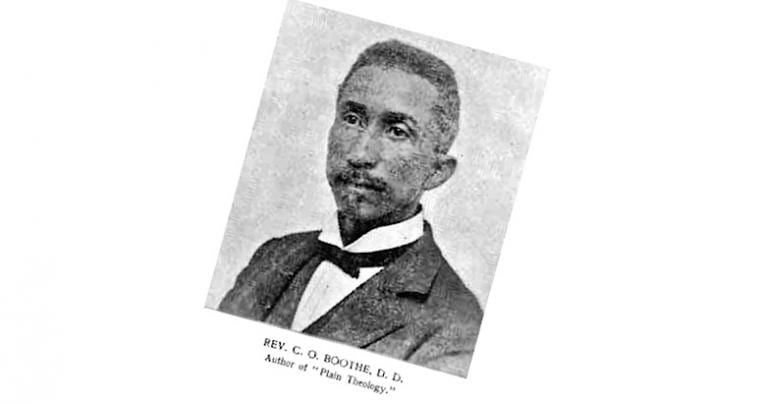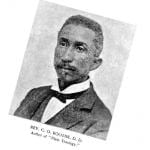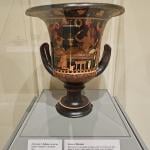 Jesus.
Jesus.
Jesus is Christianity or at least the reason for Christianity, even the broken bits. Jesus is the beginning and end of any discussion of the truth and will undergird the middle!
The Reverend Doctor C.O. Boothe set himself the task of explaining theology plainly for plain people. Think of him as a forerunner of the CS Lewis project of expounding a “mere” Christianity with an American accent and (what would come to be called) an Evangelical experience and audience.
Boothe ties Jesus to Judaism and the Jewish prophets, something that counts when you recall what was coming in the nineteenth century. He escapes the attempt in the nineteenth century and early twentieth century to get rid of the Jewish elements of the Faith and turn Christianity into “Greek” thought. The Bible (as usual) saves us from narrowness being written over thousands of years to many different people.
Here I am confronted with a first-rate mind using a maximally Biblical argument and my soul rejoices! There is a place for minimal cases from philosophy, but one must never forget the sheer beauty, force, and truth of the Bible. If I were an atheist, I would love the Bible, just as I love the Iliad, though I am no pagan.
Dr. Boothe is not talking to the unconvinced, but to the plain Christian who is already persuaded by experience and his best reason. He assumes this and creates an educational program that is sound, wholesome, and liberating, based in a great set of texts: the Bible.
Never forgotten is our need and the wholesome answer in Jesus:
We needed a “day’s man,” a Mediator, one whose nature, position, and character might enable him to appear between God and man, and lay hands upon both. Such we now have in the God-man, Christ Jesus.
The value of taking any given book in the Bible as a book is plain, but so is comparing the collection as a whole. The Bible is one book in so far as brilliant people collected individual books and found a common message. The text of the Bible is not just the discrete messages of the individual books, but the genius of the collection read as a whole. Boothe assembles this for the “plain” reader with quotations about Jesus from the sixty-six books of the Evangelical canon.
Boothe, perhaps, had an easier time imagining sin, the terribleness of what man can do to man, than many of us can. At no point, however, does Dr. Boothe present Jesus as a pawn or an unwilling victim of a vengeful God:
The giving up of his spirit on the cross was perfectly voluntary on his part, in accordance with what he had previously said. He offered himself as a willing sacrifice, thus completing his earthly work.
Jesus made a way, because He wished to do so.
Boothe’s Jesus is crucified, but also triumphant. We are left to glory in the Cross, but as Scripture does to look to the throne where our Savior sits:
it directs their eye to him as having reached the end to which his faith looked, and presents him also as the “Finisher,” or Perfecter, of their faith, leading them on until they rejoice, receiving the end of their faith, even the salvation of their souls (1 Peter 1:9).
Boothe has a Christ who consents to be crucified, but is King, victor of his foes. A balance that might be missed by some is kept in Boothe, the careful exegete:
There is also another portion of the Lord’s work in heaven, which is not so often referred to as his work as High Priest—his work as King. In order to gain a clear understanding of this, we must refer to what is said of the position he holds in heaven, and of the authority entrusted to his hands, and of the parties for whose benefit he wields that authority.
If we are imitators of Christ, then we do imitate Christ’s humility, the hard lesson for any of us with power, but if we are powerless, we can claim an eternal truth: Christ King. The plain people hear the Word of the Lord:
There was a work for them to do, a work to be done amidst suffering and toil and danger. He knew it all from his own personal experience. He knew also what they needed to nerve them for the work and suffering and various trials before them. Hence, when he met his own on the mountain in Galilee, he first pointed them to the lofty position to which he was about to be raised: “All power is given unto me in heaven and in earth” (Matthew 28:18).
Christians exalted should humble ourselves before God, but the poor Christ never sends empty away.
Boothe, Charles Octavius. Plain Theology for Plain People (Lexham Classics) . Lexham Press. Kindle Edition.











